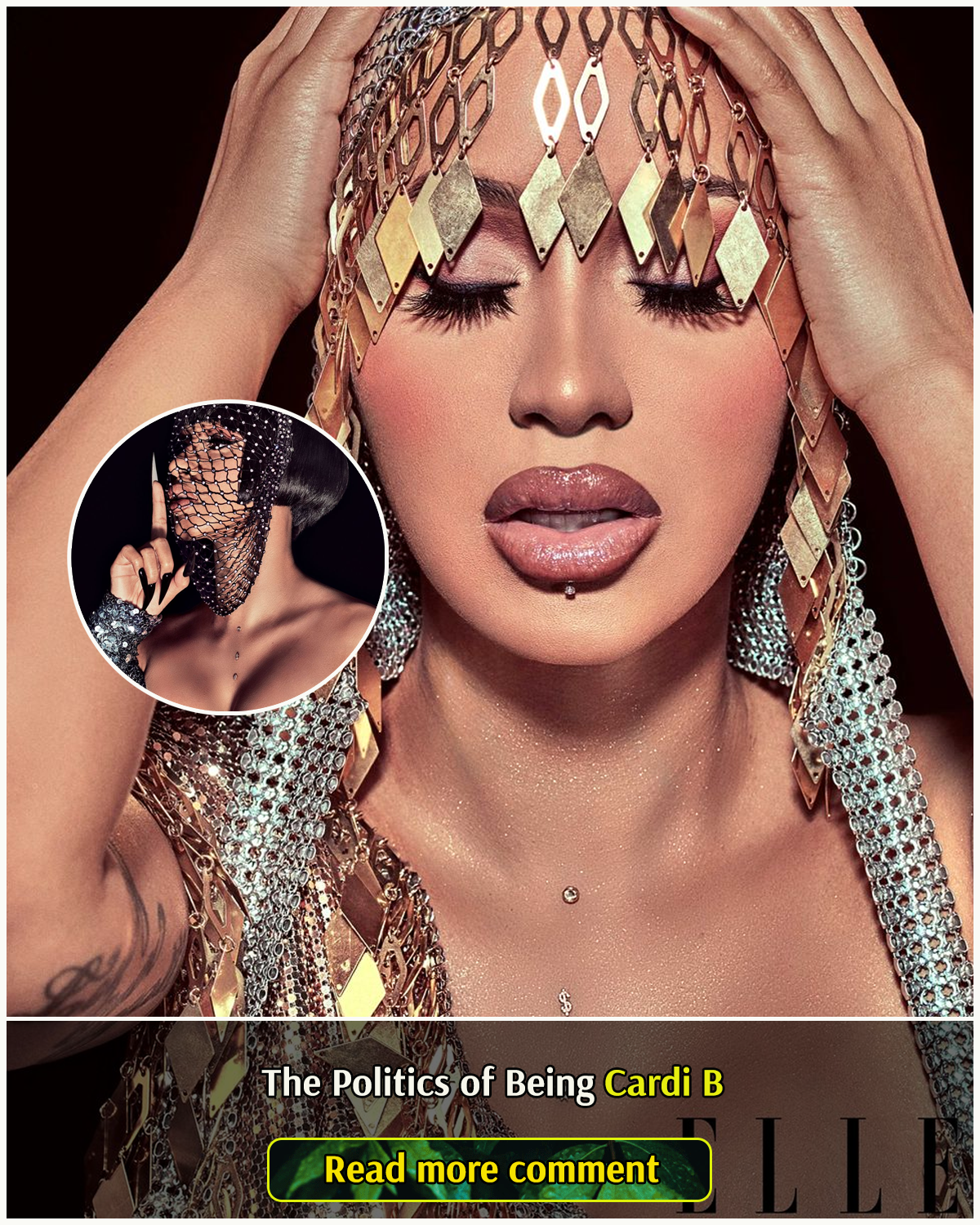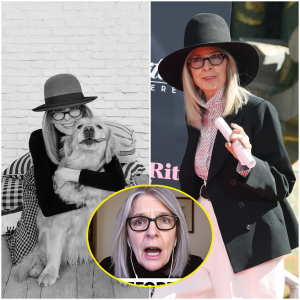She isn’t perfect, nor does she claim to be, but the rapper is learning, growing, and proving with her sophomore album that she and her powerful voice are here to stay.
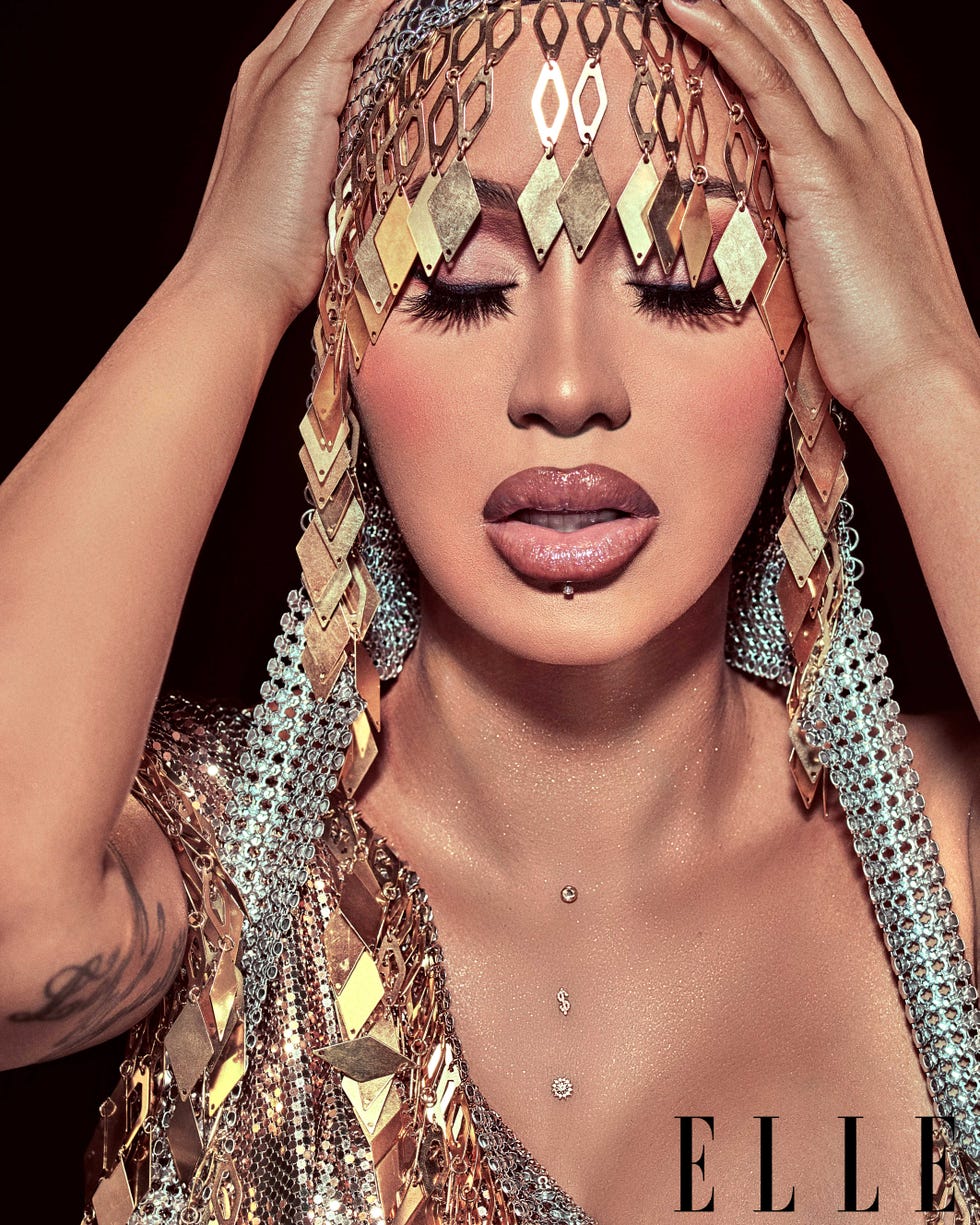
It feels like a lifetime ago, given the breakneck pace of the news and the steady erosion of our political system, but it has only been a year since rap lightning rod Cardi B sat down with Democratic presidential hopeful Senator Bernie Sanders in a Detroit nail salon in the summer of 2019. The polymathic force—former stripper/onetime reality star/raptress/ wife/mother/hellion—converted the salon into a backdrop for an earnest conversation around the most urgent issues facing Americans today: job creation, police brutality, a livable minimum wage, and workers’ rights. The scene was full of obvious asymmetry—Cardi’s glamour-puss persona played irreverently off Sanders’s mensch—but in many ways, it was just two New Yorkers talking about the issues of the day, with all the camaraderie of the politicking found at any Dominican bodega that dots Cardi’s native South Bronx neighborhood.
This wasn’t the first time that Cardi, born Belcalis Marlenis Almánzar, had spoken out about politics; in fact, the voluble rapper, who experienced meteoric fame after the release of 2017’s chart-topping “Bodak Yellow,” can’t keep herself from doing so. Whether imploring fellow celebrities and influencers in unprompted Instagram videos to use their platforms to speak out against President Donald Trump’s draconian rule, or expressing her infatuation with the New Deal in a 2018 GQ interview, Cardi never minces words. She is a lifelong history buff—a gangsta with a thing for Franklin Delano Roosevelt.
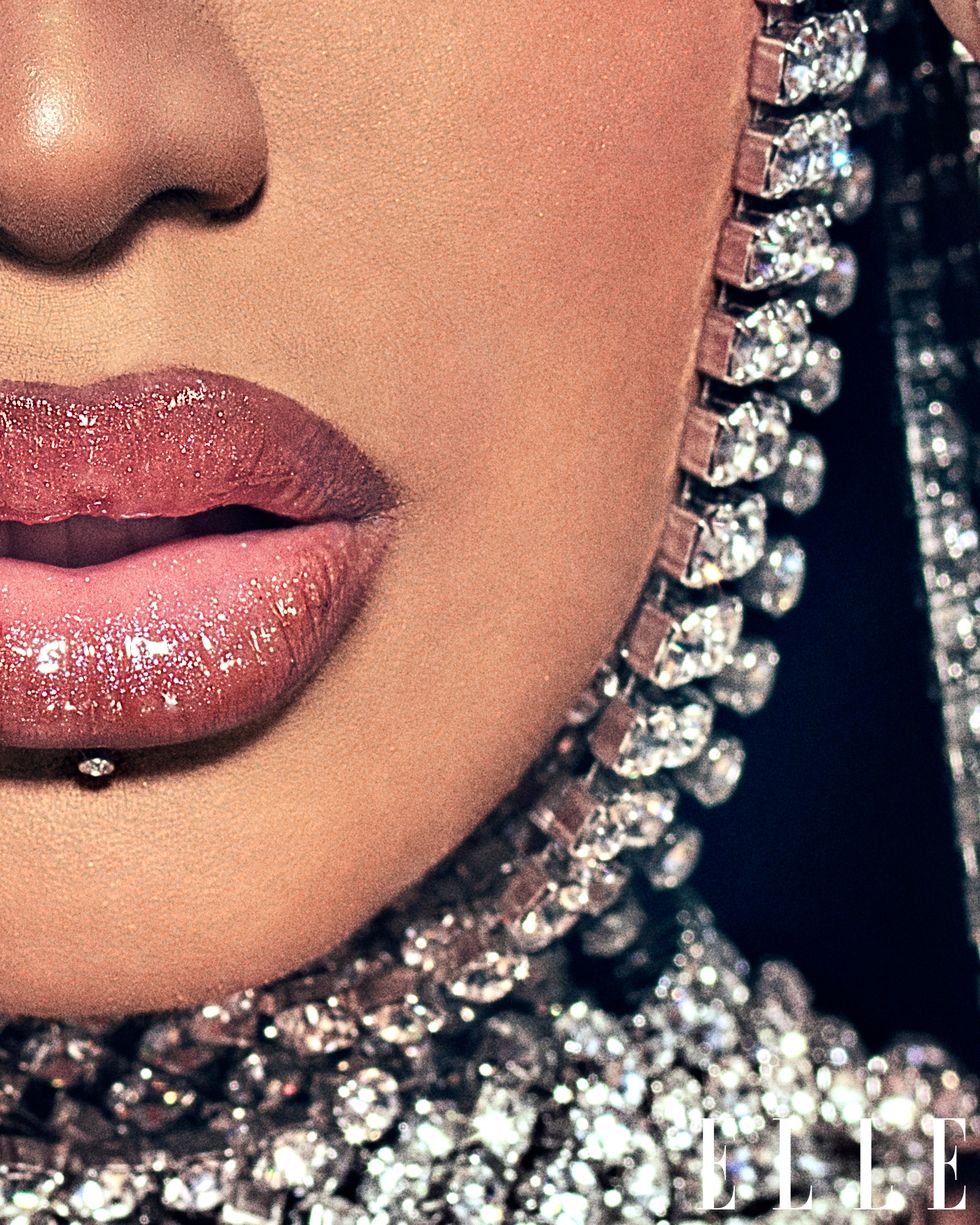 STEVEN KLEIN
STEVEN KLEIN
Still, her decision to sit down with the senator immediately courted controversy, turning the comments section of her Instagram into a battleground of dissent. Nearly every time she speaks on such topics, a rush of online naysayers balk at the self-described “regular degular schmegular girl from the Bronx” making a foray into politics: “You need to stick to rapping, sis, you obviously don’t know what you’re talking about,” one commenter wrote. Fox News panned Cardi’s and Sanders’s meeting of the minds, slut-shaming her for her former work as a stripper while ignoring the fact that the current resident of the White House was once embroiled in an alleged affair with a porn star. But as Cardi declared in the 2019 song “Clout,” “Public opinions from private accounts / You not a check, then you gotta bounce,” referring to the verified check marks on social media platforms. Which is to say, Cardi will not be quieted by bots, avatars, critics, or trolls.
Nearly a year later, in early July, I’m on the phone with the rapper, who is in L.A. prepping the first video of her long-awaited sophomore album. The topics covered in her prescient heart-to-heart with Sanders are now playing out in real time. COVID-19 has sent the U.S. economy into a recession and triggered mass unemployment (“A lot of my family caught COVID. A lot of people around me lost their jobs,” Cardi says). The Republican-controlled Senate’s response has left millions of Americans struggling to make ends meet with a mere onetime $1,200 stimulus check. All while unarmed Black men and women are being killed by the police in the streets and in their homes with impunity. Oh, and the presidential election has been whittled down to just two candidates, with “Uncle Bernie,” Cardi’s nickname for Sanders, having conceded to former vice president Joe Biden in April.
Of course, the rapper never could have foreseen a global pandemic, nor its fallout, but she recognized early on the value in remaining politically engaged and the significance of the upcoming presidential election. While she may be disappointed that Sanders has dropped out of the race, she assures me she is committed to doing anything to get Joe Biden elected. She wants Trump out of office, describing him as an ineffectual leader. “Those people that he caters [to], he’s not going to do anything for them. It’s not like Republicans are getting better housing. It’s not like Republicans are getting better benefits. They’re not. He’s not doing anything for anybody. He’s just saying things that appease the same people.” Cardi has a different vision. “I want a president who makes me feel secure. I want a president who understands the pain of the people. I want a president who is going to give us answers,” she says, wistfully. “That’s why I like [New York governor Andrew] Cuomo. I like him because he makes me feel like he’s listening to me.” She’s been rallying her loyal Bardi Gang fan base to become more active in their electoral system, voting in elections at all levels: “You can vote for DAs. You can vote for mayors. You can vote for your district. Not everything is the president. You know what I’m saying?”
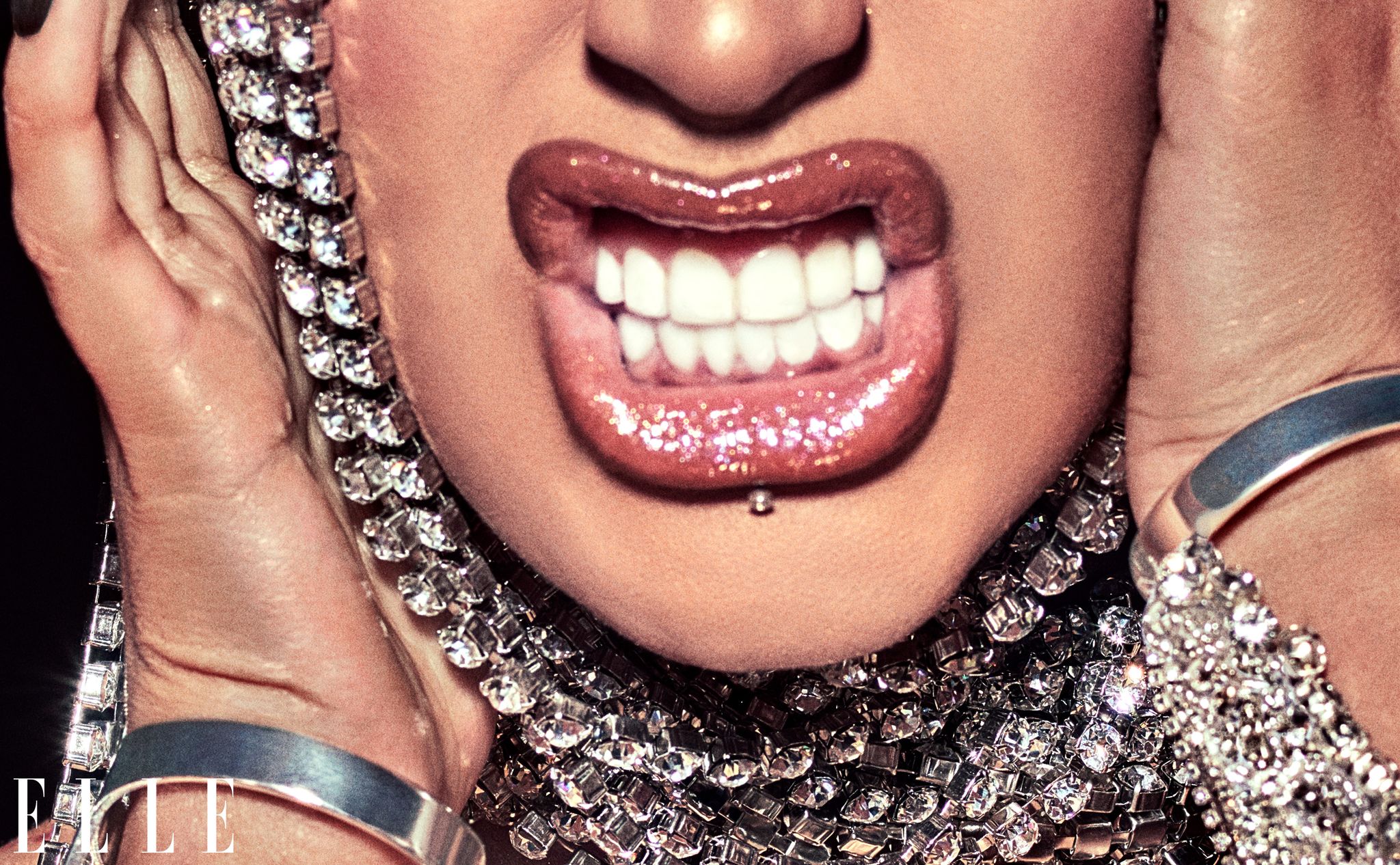 STEVEN KLEIN
STEVEN KLEIN
Crystal wig, Area. Cuffs, Mordekai by Ken Borochov.
Cardi’s message is piercing, and unlike many of her celebrity peers, she seems to be able to get through to her millions-strong online community, using diaristic Instagram Lives as a brand of rogue daily press briefings. On a recent standout episode, she launched into a seething, unedited soliloquy on how carelessly she saw the public responding to COVID, all while balancing a towel on her head, a robe around her waist, and clicking and clacking her trademark talons for added effect. “Y’all not taking it motherfuckin’ serious!” Pounding her fist against a takeout container, she was both the picture of a wisecracking, concerned mother and a New Age political savant. In recent weeks, Cardi has put out forceful statements on current events that bear no resemblance to canned press releases or performative activism. After participating in a call that gun control advocate Tamika Mallory arranged with Breonna Taylor’s mom, Tamika Palmer, and other celebrities, Cardi became wholly invested in the wrongful death of the 26-year-old Black EMT, who was fatally shot eight times in her home by plainclothes police officers in Louisville, Kentucky. The officers justified entering with a so-called no-knock warrant. “That is so insane to me. [I saw] Breonna Taylor’s name everywhere, but I didn’t really know her story,” Cardi says. “What they did to her is really fucked up. Really fucked up.” She is enraged about the lack of justice: “What’s the excuse? Why is the cop not in jail? Wasn’t what he did a crime? It’s a crime! And no apology. No apology. No video of the cop coming out crying, ‘I fucked up. I don’t this. I don’t that.’ Nothing. It’s nothing. I don’t even know how her mom still holds her head up. Unbelievable.”
Cardi became incensed upon hearing Palmer, who filed a lawsuit against the officers involved in May, recount the painful and confusing treatment she received from the police department in the hours after her daughter’s murder. Officers sent Palmer to the hospital despite knowing Breonna’s body remained in her home; she told Cardi and the other celebs on the call that the police gave her the runaround for hours when she asked questions about Breonna’s fate. “Imagine how frustrated her mom was, crying, probably hysterical. The cops call her saying her daughter is in the hospital, and her daughter is not even there. Then the person who’s supposed to protect her is asking her mom, ‘Do you know anybody who [would] want to hurt Breonna Taylor?’ when you guys know who killed her!”
The harrowing account reminded Cardi of when her own cousin was murdered: “I remember everybody waking up at 3 a.m. and driving all the way to New Jersey, to the hospital. And through all that driving, you’re crying and scared and everything.” The experience inspired her to join a growing cadre of notable women (Beyoncé, Oprah, Senator Kamala Harris) who have pleaded for charges to be brought against the offending officers involved in Taylor’s murder: Jon Mattingly, Brett Hankison, and Myles Cosgrove. “Don’t let Kentucky Police Department get away with this shit!!!!!” Cardi wrote in a paragraph-long Instagram caption detailing Taylor’s case that she posted in early June. Cardi would go on to change her IG avatar to simply “Breonna Taylor” to pay homage and bring continued awareness to the issue.
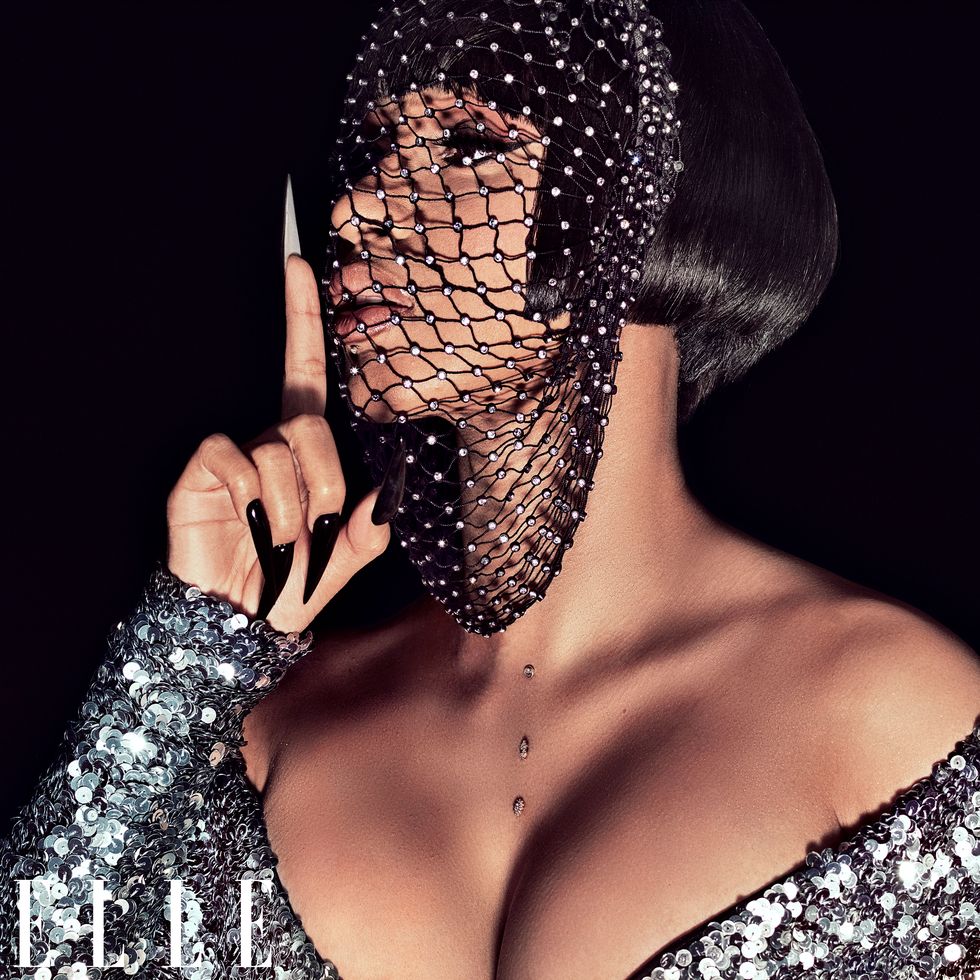 STEVEN KLEIN
STEVEN KLEIN
Top, Balenciaga. Swarovski crystal veil, Keren Wolf.
She says she wishes she saw more male rappers speaking out about Taylor’s killing. “A woman like Breonna Taylor, she was young. She looked like she was listening to your music. She looked like she was your fan. You should stick up for her,” she says. While some would hesitate to call Cardi a “conscious rapper,” her words speak to a larger conversation currently being waged within the rap community around the political responsibility of top-tier male hip-hop artists. Chance the Rapper and J.Cole, two rappers who are often lauded for their introspective body of work, noticeably waded into the debate around the state of America’s political unrest this past summer, but both clumsily responded and were chastised publicly for their polarizing stances. Cardi’s advocacy for progressive social policies like Social Security and other public safety nets often puts her in a league of her own.
If I don’t fucking like somebody, I am going to let them know I don’t fucking like them, or I don’t fuck with them, or I’m not feeling their energy.
Of course, Cardi’s politics are not above reproach. The rapper has been “canceled” many times (there were at least four attempts in 2019 alone) for incendiary comments that were viewed as glorifying crime, and guilty of colorism and racism. The list of offenses is lengthy, and includes years-old footage of Cardi admitting to drugging and robbing men during her stripper days, as well as resurfaced tweets of Cardi using the word cockroach to allegedly describe dark-skinned Black women. More recently, Cardi was accused of keeping a ghost Instagram account in which she allegedly commented on other celebrities, including Megan Thee Stallion, Ariana Grande, and eternal foe Nicki Minaj. “I saw I was trending on Twitter, and I’m like, ‘What the fuck?’ ” Cardi says of seeing the hashtag #CardiBIsOver. “I’m like, ‘Jesus Christ, what did I do now? Like what?’ ” In response, she posted a video on Instagram, seemingly unfazed, showing off what she was wearing to her own “cancel party” (a white slip dress and matching Christian Louboutin heels) before jumping into a pool, fully clothed. “If I haven’t been posting on Instagram and eating food and that still bothers y’all, that just means I’m really that important in your heart and my press is really part of your soul. And guess what? I don’t give a damn. Bye!” she ranted in the footage.
Speaking with her now, the IDGAF facade seems to have worn thin. “I cannot believe 73 people are trying to cancel me over a lie. Can you imagine me having a fake Instagram account to talk shit about different artists that I don’t even think about?” she says. “I’m 27 years old, you know what I’m saying? I’m 27 years old and I have big bills, big responsibilities, and a kid who’s on my ass a lot.” Besides, as Cardi explains, she has never been one to hide her feelings, so a ghost account feels antithetical to who she is. “If I don’t fucking like somebody, I am going to let them know I don’t fucking like them, or I don’t fuck with them, or I’m not feeling their energy. I’m not going to make a fake Instagram trolling artists, talking shit about artists. Are you crazy?”
But even before the dust could settle on that turmoil, Cardi was trending again, weeks later, for using the term chinky eyes to describe her two-year-old daughter Kulture’s eyes. The internet’s response to her using the racial slur—an insult that originated in the late nineteenth century to describe the monolids of many Asian people—was swift, especially considering the rise of anti-Asian racism in the wake of the coronavirus pandemic. The rapper quickly responded, explaining that she never knew the racist origins of the term. “Never in my life, my 27 years, I never even knew that was a racial slur,” she tells me. “I was describing my husband’s and my sister’s eyes, and my daughter’s eyes…. I don’t even know how to describe their eyes anymore because that’s how I used to describe their eyes. I don’t even know the word. That they’re almond shaped? But it’s like, I never knew that. And for people to be like, ‘She’s using a racial slur. She’s disgusting.’ And it’s like, ‘Bro, I didn’t even know that was a racial slur…. I didn’t say it…with no bad ill intention.’ ”
After each failing, Cardi undergoes a very public unlearning process, which seems to be in line with her evolution from her impoverished background to international superstardom. Rewatching Love & Hip Hop New York, which she starred in from 2015 to 2016, it’s clear her worldview has broadened in the years since. She has worked to shake off old habits and outdated ways of thinking. She acknowledges what she knows and what she doesn’t. And laments the shortcomings of her upbringing, while never apologizing for where she came from. As she’s said in the past, “I made the choices that I did at the time because I had very limited options. I was blessed to have been able to rise from that, but so many women have not. Whether or not they were poor choices at the time, I did what I had to do to survive.”
But cancel culture doesn’t often allow for such a learning curve. The public shaming of public figures over offensive behavior or remarks is often an attempt to right systemic issues in a single firing or career-ending takedown. Except that Cardi’s “cancellations” have hardly been the end of her—it is her unedited style and delivery that have made her famous, to begin with, and almost immune to such outcry. The public can certainly be mad or disappointed in the rapper, but she’s a populist artist, a woman of the people. If anything, Cardi’s foibles have made her more accessible—someone flawed who is looking to address and repair her blind spots.
“I want a president who makes me feel secure. I want a president who understands the pain of the people. I want a president who is going to give us answers.”
Still, she remains genuinely perplexed by her constant cancellations. “It’s like I have a target on my back, but it’s not because of my music. Because I haven’t done music for eight months, and people still try to attack me,” she says. “I feel like people are attacking me because they want me to feel the pressure of bullying, and they want me to give up, and they want me to say, ‘Oh, I quit music’ or ‘I’ll delete my Instagram, delete my Twitter,’ and I’m not willing to do that. No one will ever have that much power [over] me.” One has to wonder, given her recent musings, if her new album will be her Lemonade—a pointedly political body of work that infuses her notoriously bombastic lyrics with feminist and social justice mantras. “My music is always going to make a woman feel like a bad bitch. When you make a woman feel like she’s the baddest bitch in the room, to me, that’s female empowerment,” she explains. “But this album is going to be really different. Of course, it’s going to have my Lemonade moments, my personal relationship moments.”
The separation of church and state within her artistry is crystal clear once the rattling bass of Cardi’s newest song, “WAP” (read: Wet Ass Pussy), springs forth. Sampling Frank Ski’s “Whores in This House,” it’s a jaw-dropping take on the classic that finds Cardi paying homage to the power between her thighs. Brimming with clever innuendos, swag, and BDE (Big Dick Energy), the rapper ticks off a list of sexual demands for her lover, from being tied up to erotic asphyxiation. Featuring Megan Thee Stallion, the Houston-based “cognac queen” raptress, the new track is a mash-up of chart-topping, sex-positive female rap powerhouses that is bound to start Instagram dance challenges, as well as chatter around Cardi’s musicology and the state of female rap.
